International Day of Women and Girls in Science
The United Nations has declared February 11 the annual International Day of Women and Girls in Science. To celebrate, we’re introducing you to just a few of the women who work here at the DLC! Read below for their stories, and stay tuned for additional features later this year!
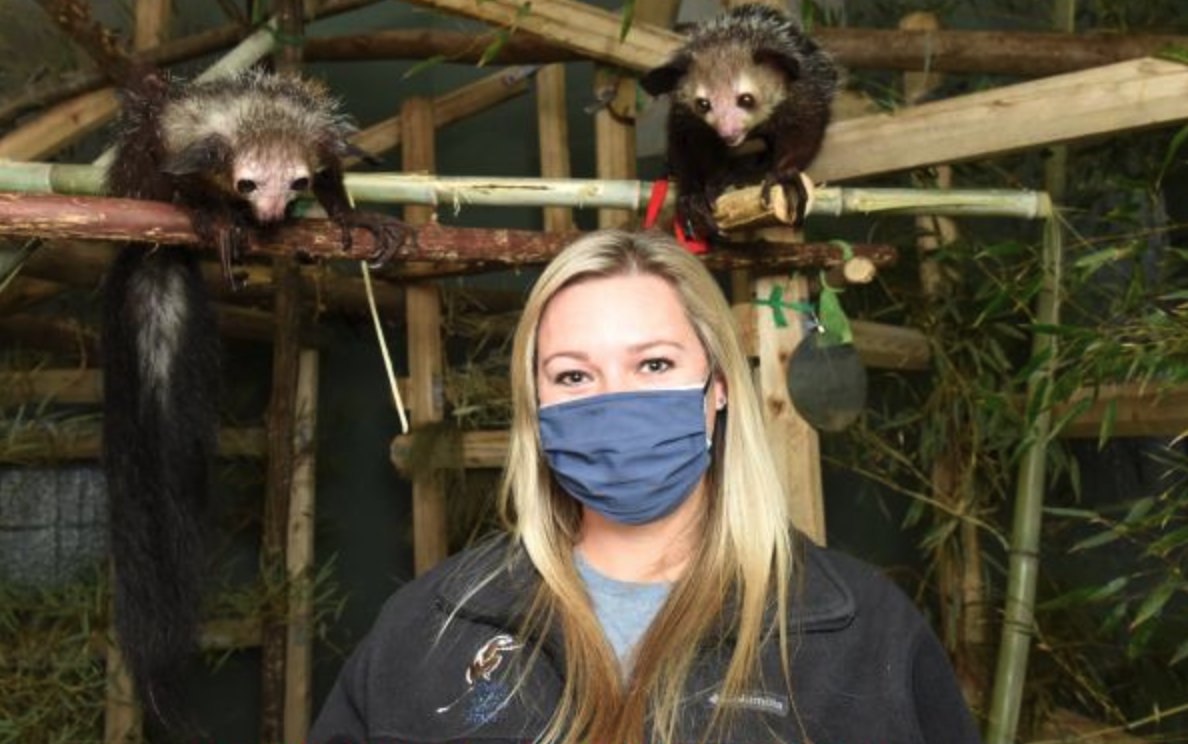
Kristin with aye-ayes at the DLC.
Kristin Clark
Assistant Curator
“The struggle to break into the animal keeper world was real. So, I took a different route and landed a job as a sea turtle technician at Sea Island Resort in Georgia, where I gained experience managing sea turtle nests, strandings, and outreach. From Sea Island my road led to Loudoun County, Virginia where I worked as part of the Loudoun County Animal Control team. The shelter was very much advanced in their operations and I was introduced to and heavily involved with positive reinforcement training, which was a big influence on me.
“With additional experience now under my belt, I began searching for the keeper job I had envisioned for myself. I was fortunate enough to land an assistant aquarist position with the North Carolina Aquariums, where I worked for 12 years. After discovering the Duke Lemur Center a few years ago, I immediately knew it and its mission was on the short list of places I would consider leaving the aquarium for and I accepted a research position with DLC. I was admittedly nervous about straying from my comfort zone of animal husbandry, but a chance to join the DLC team was an opportunity I couldn’t pass up! The research position and the assistance I was able to provide to the husbandry team during Covid-19 eventually led me to my current position of Assistant Husbandry Curator and back to my roots in husbandry.
When I take time to reflect on my journey, I’m incredibly grateful that I didn’t have a direct path that led me to treasure. Instead, I followed a meandering stream with precious gemstones I gathered along the way. I am presently at the beginning of yet another gem-bound journey.”
Click here to read more of Kristin’s story.
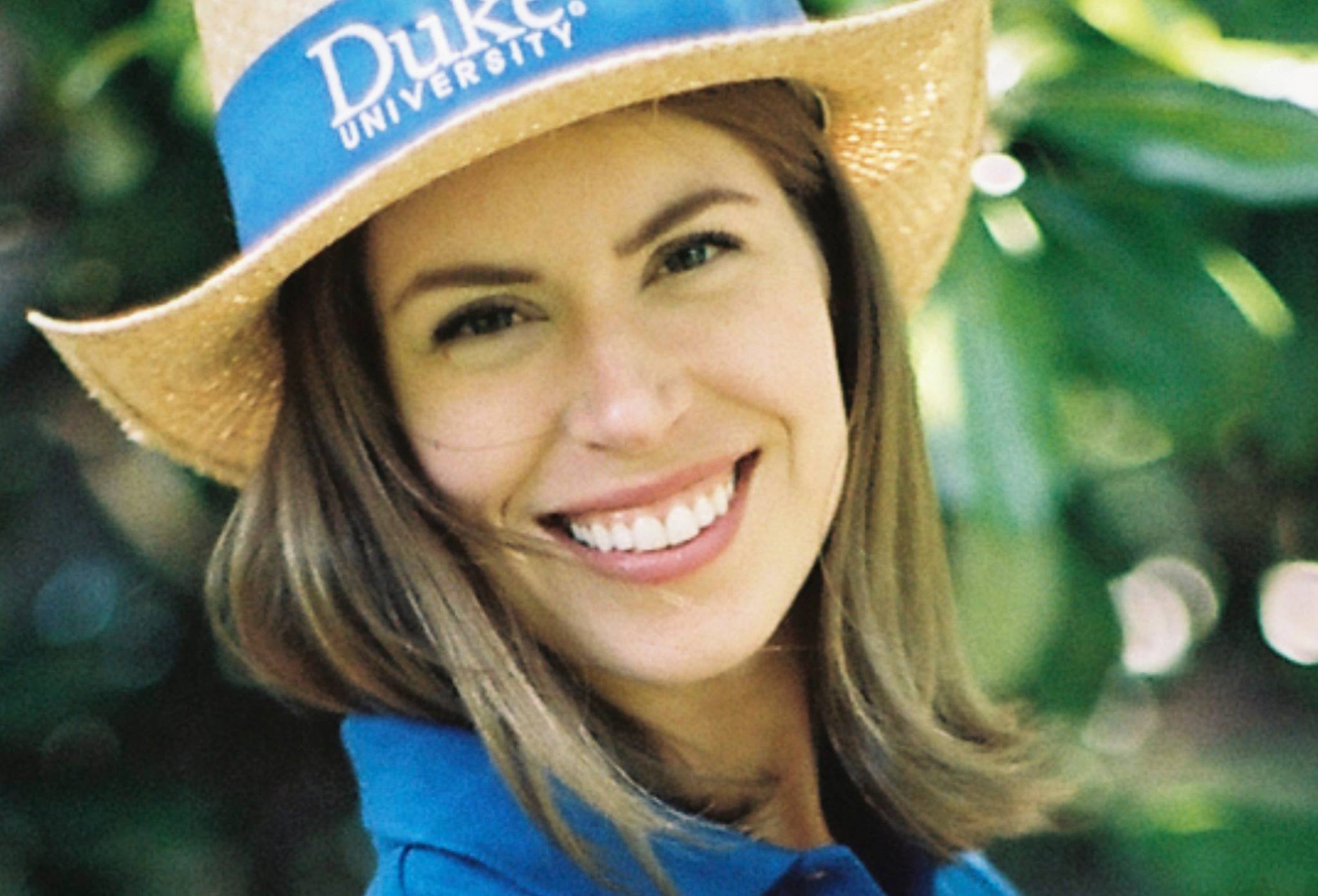
Sara assisting at Duke University’s commencement ceremony.
Sara Clark
Director of Communications
“I’m the daughter of a seventh-generation farmer, a former 4-H club president, champion sheep showman, and all-around farm kid hailing from the Appalachian foothills of southern Ohio. Our neighbors are Amish. If you’d told 12-year-old me that someday I’d be a communications director at a globally-ranked university just outside the ‘Silicon Valley of the East,’ I’m not sure I would’ve believed you!
“After undergrad, I actually sold Nissan cars and trucks for 2.5 years before figuring out what I wanted to do for grad school. That experience—sales, negotiation, customer service, even repping Nissan at auto shows—was invaluable. I didn’t know it then, but it would form the foundation of my future career.
“By the time I enrolled in grad school at Duke, I was probably the only Blue Devil who could read in four languages, hawk a pick-up truck, AND castrate a goat. But that combination of academic, sales and marketing, and animal experience made me uniquely qualified for the career I have now. The journey was… non-traditional, to say the least! But it’s also an example of how our various wanderings can shape us for our future careers. It’s never too late to find your ‘dream job’—even if you had no idea what it was decades ago when you graduated from high school!”
Click here to read more of Sara’s story.
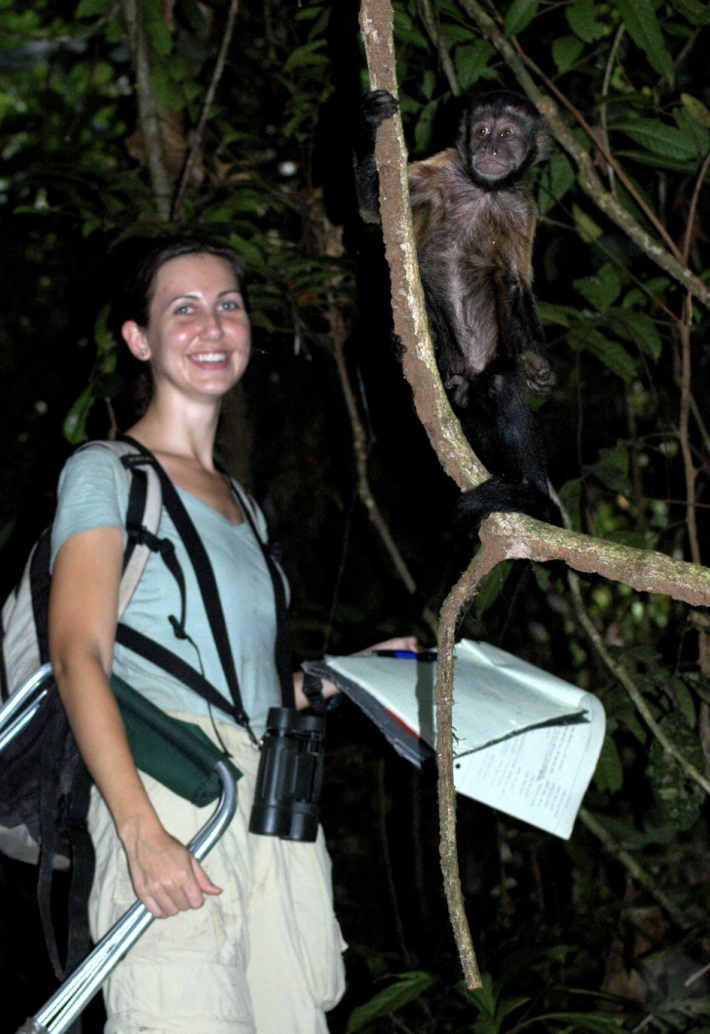
Erin in the field.
Erin Ehmke, Ph.D.
Director of Research
“As the Director of Research at the DLC, my vision is to expand our research programs in both Durham and Madagascar, serving as a model institution that prioritizes animal welfare, high-impact research, and access to opportunities for all students and scientists around the world. When I was younger, I dreamt of this path but did not know how to achieve it, partly because I did not realize all the various opportunities that were out there. I encourage all students, of any age, to try new experiences. And I make it my personal mission to make opportunities accessible for students trying to find their own paths.”
Click here to read more of Erin’s story.
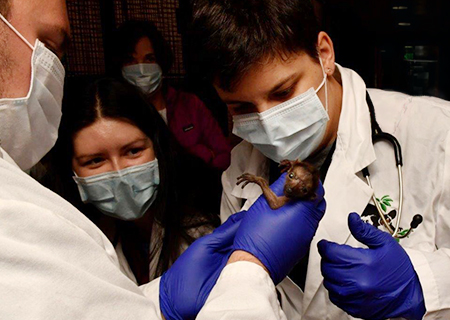
Laura examines a blue-eyed black lemur infant. Caring for fragile and endangered animals is never easy. For lemurs, the challenge is compounded by the fact that there are no published books on lemur veterinary medicine.
Laura Ellsaesser, D.V.M.
Staff Veterinarian
“I work with the rest of the DLC’s veterinary team to provide world-class health care to the our colony of over 200 lemurs and bush babies. Depending on the day, this might mean combining my specialized knowledge of lemurs with utilizing my skills built in small animal general practice, including performing routine exams, providing vaccinations and dental care, or practicing small animal emergency medicine—such as caring for critically ill animals or performing emergency surgery. I enjoy consulting with a large network of area specialists, from cardiologists to radiologists to acupuncturists, to provide cutting-edge care for these remarkable endangered prosimians.
“Beyond prosimian medicine, I’m passionate about increasing diversity within this profession through mentoring students, helping them realize opportunities to carve their own career paths, and collaborating with students and researchers to continue learning more about lemurs.”
Click here to learn more about Laura.
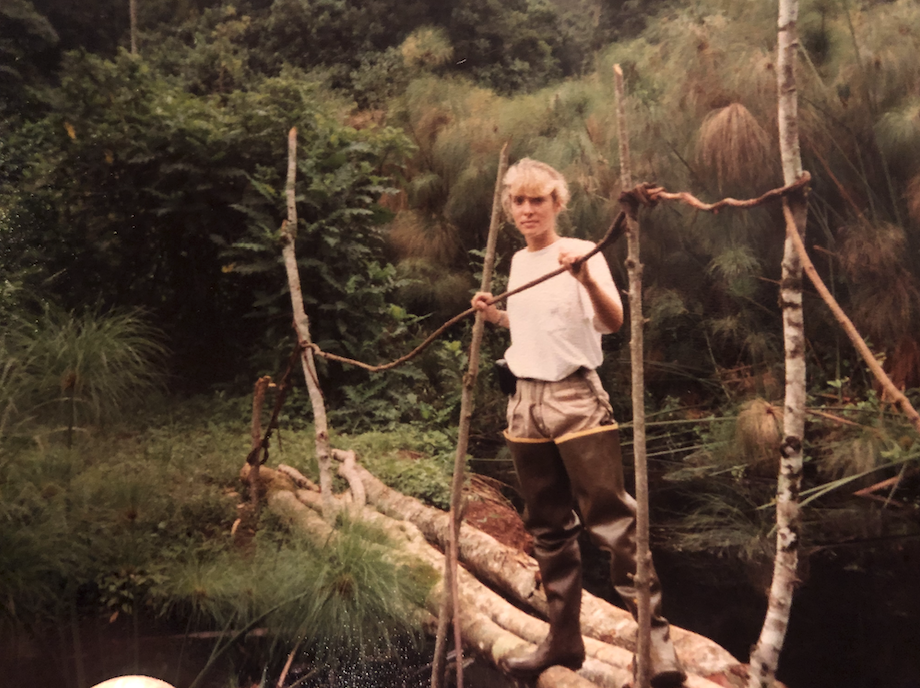
Britt in Uganda as a young zookeeper and researcher.
Britt Keith, M.Sc.
“I started in the zoo field when I was 16, having cleaned stalls at my local horse barn since the ripe old age of seven. The famous Bronx Zoo got me hooked after I attended a summer internship that year. It was so exciting to be around all of those animals, and to learn so much about captive wildlife and their care. It was just a couple of us young women in a sea of young men…
“Now, after nearly 14 years of working at the Duke Lemur Center, I am hard-pressed to find even a quarter the number of men as there are women applicants who want a career here. Such the opposite of my early experiences! All to say, I’m proud to work with the women that I do. They’re such a passionate and hardworking bunch, and having the opportunity to mentor more and more women and girls in science is one of my greatest life’s achievements. It’s a big amazing world.”
Click here to read more of Britt’s story.

Julie uses positive-reinforcement training to teach ring-tailed and red fronted lemurs to voluntarily sit on a scale for routine weighings. Note: this photo was taken pre-Covid; masks are now required.
Julie McKinney
Lead Husbandry Technician, Research Technician
“To say that I have wanted to work with animals since I was little is far from an exaggeration. I knew ever since I was a girl that I wanted to be a zookeeper. Knowing this, my mom found an explorer program that I could participate in, and off to the Pittsburgh Zoo we went! At the zoo, I had the opportunity to talk with the reptile keeper who told me, ‘I’d rather work with someone who has wrestled an alligator than read about them in a book.’ He suggested that I attend the Santa Fe Community College Zoo Teaching Program in Gainesville, FL. In fifth grade, I packed my bags and waited!”
Click here to read more of Julie’s story.
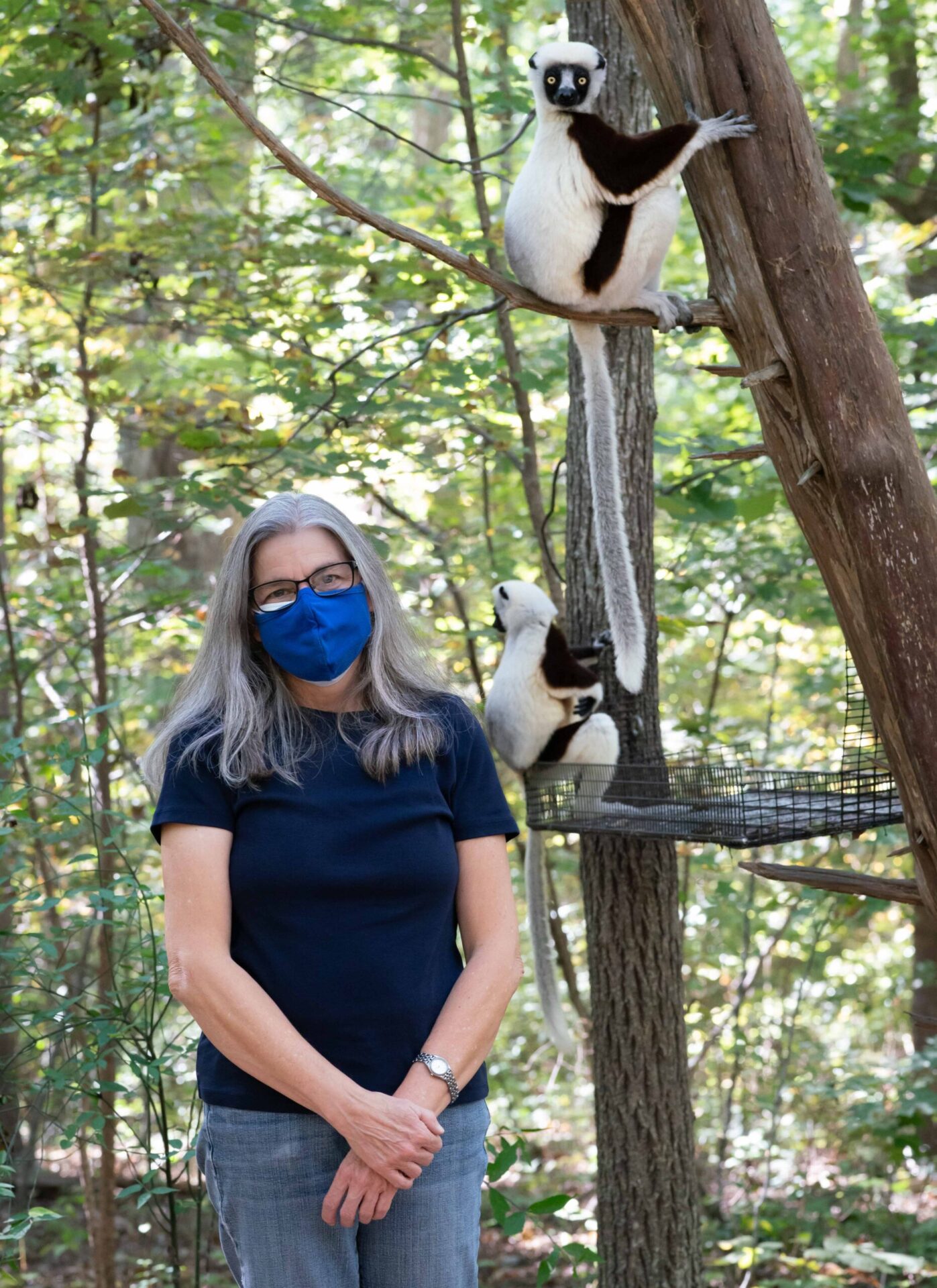
Chris with sifakas at the DLC.
Chris Wall, Ph.D.
Assistant Director of Research
“From an early age, I wanted to be a scientist—but I didn’t take a straight path from college to getting a Ph.D., which gave me the chance to explore different jobs. In graduate school, I was captivated by the complexity of anatomy and by the power of the theory of evolution by natural selection. I decided to work on answering questions about how function connects anatomy and evolution. I’ve worked in the Department of Evolutionary Anthropology at Duke since 1994, first as a postdoctoral researcher, then as a research professor. Many of my favorite research experiences developed in unexpected ways, and I encourage students to embrace opportunities even if they don’t seem to fit perfectly with their career plans.
“My research included work at the Duke Lemur Center throughout my career, and I’ve been a Senior Research Scientist here since 2018 (after retiring from my faculty position in Evolutionary Anthropology). Currently, I am the Assistant Director of Research. This is my post-professor dream job because its focus is STEM education and grant design/writing across all departments, giving me an opportunity to contribute to the research, education, and outreach missions of the DLC.”
Click here to learn more about Chris.
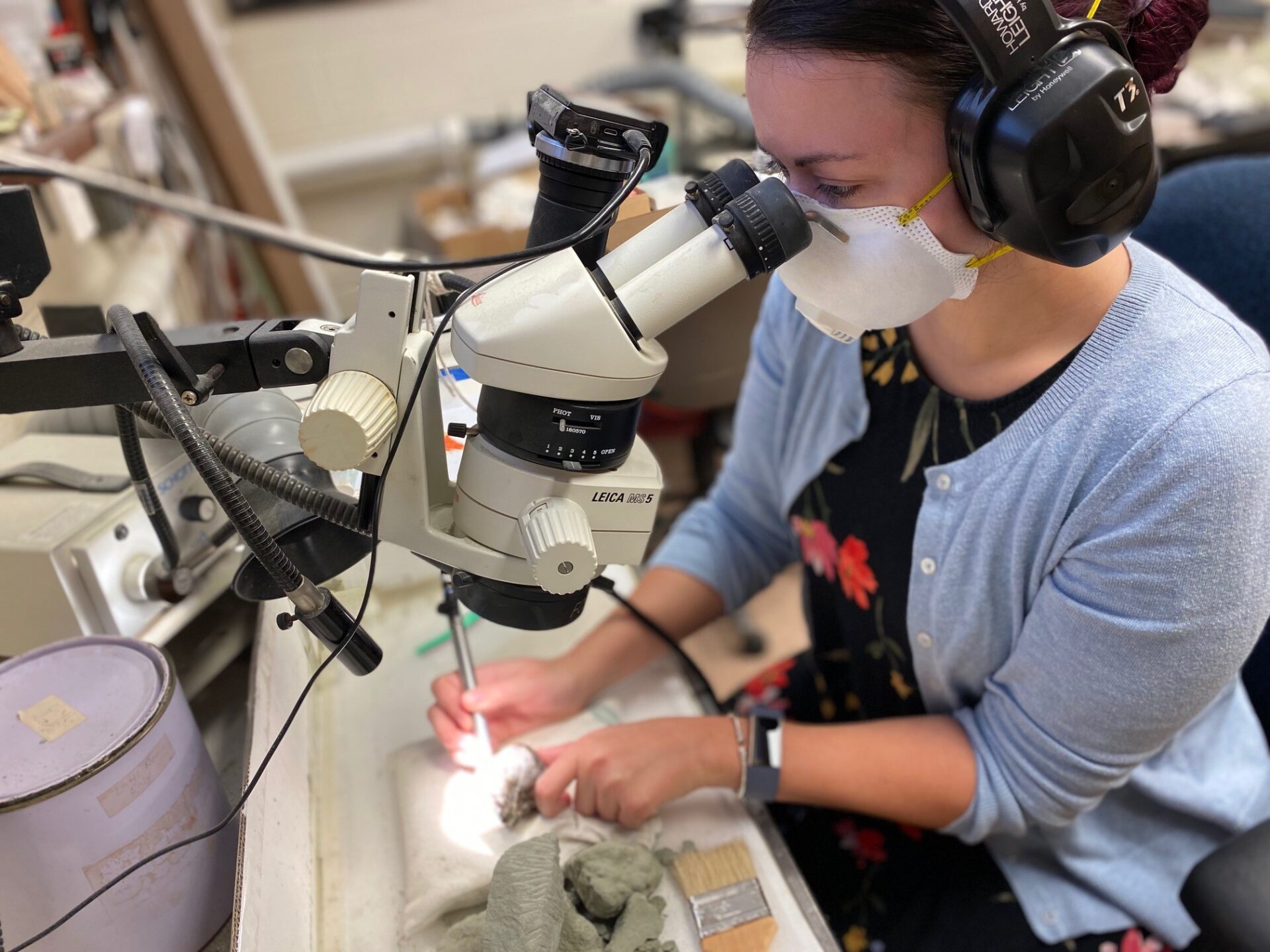
Karie at work in the DLC fossil lab.
Karie Whitman, M.S.
Fossil Preparator and Exhibit Designer, DLC Museum of Natural History
“My career path zig-zags between my interest in the environment and my skills handling delicate fossils. Growing up, my fondness for nature turned into a B.S. in Ecology and Evolutionary Biology from the University of Michigan. There, I secured a work-study position in a paleontology lab, where I gained four years of experience preparing fossils for museum display and research. After graduation, I did a short AmeriCorps term as an Environmental Technician in Northern Michigan.
“Later, while using my fossil preparation skills as a lab coordinator at Ohio University, I pursued an M.S. in Environmental Studies. My master’s research led me to Madagascar, where I learned to speak Malagasy while studying complexities of sustainable agriculture near protected areas for biodiversity conservation. While in classes for my M.S., I took an infographics course that opened up a whole new area of curiosity for me in graphic design and science communication. All told, I wound up being uniquely suited to my job here at the DLC Museum of Natural History, where all of my interests and talents are utilized and valued!”
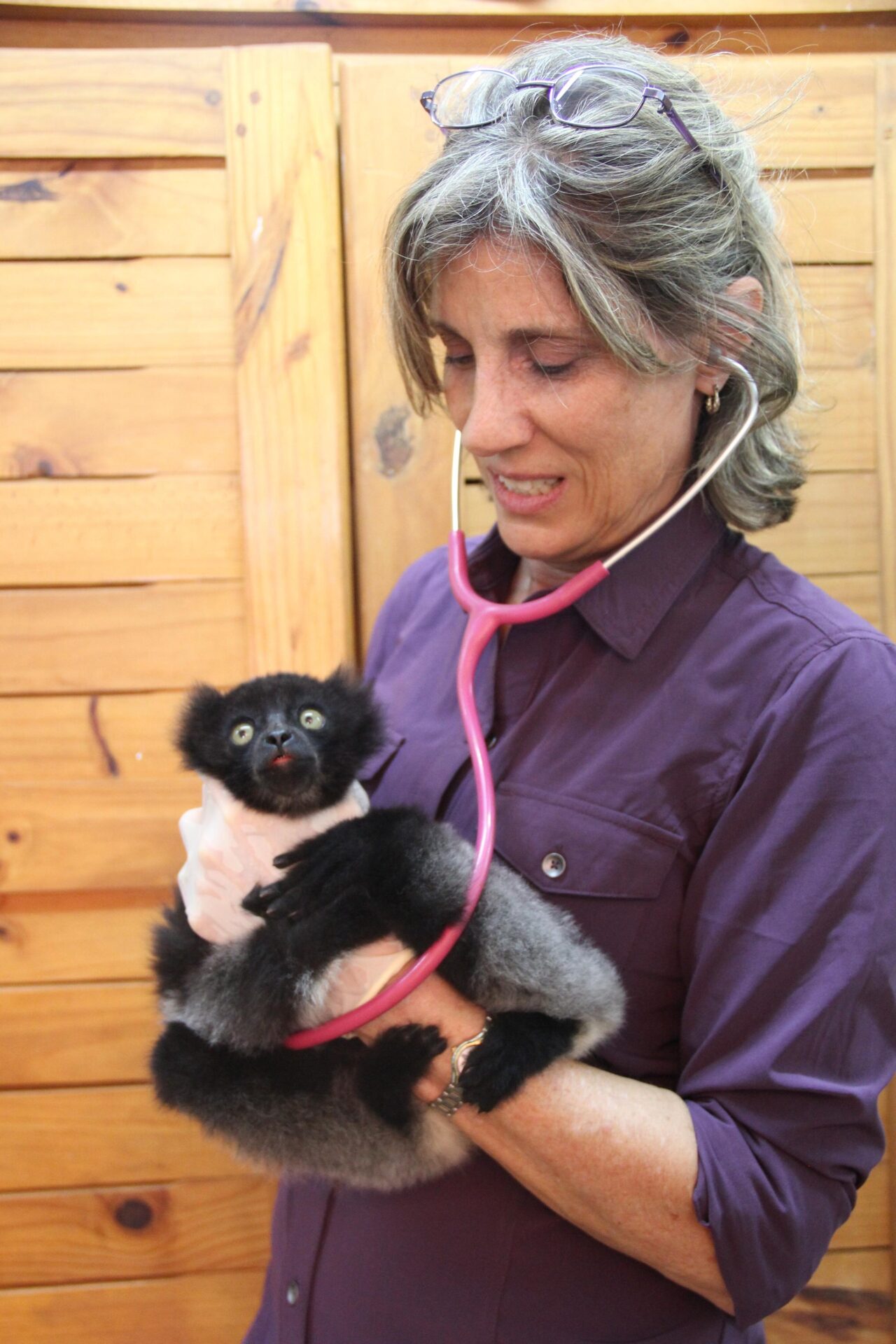
Cathy examines an infant Indri in Madagascar.
Cathy Williams, D.V.M.
Senior Veterinarian
“For the first 10 years of my career, I honed my skills in medicine and surgery in traditional domestic animals, including cows, horses, and companion animals like dogs and cats. A long-standing love of wildlife and the environment led me to the Duke Lemur Center 26 years ago, where I’ve worked ever since to ensure the health of lemurs at the DLC and to understand the diseases that affect these endangered mammals in the wild and within human care. Partnering with Duke researchers and veterinarians in the U.S. and Madagascar, I also study the impacts of changing environments and human activity on these unique primates.”

